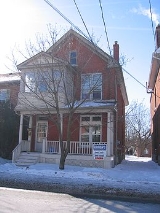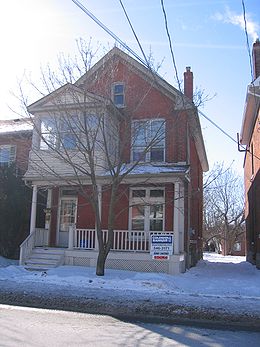
Kingston Student Ghetto
Encyclopedia
The Kingston student ghetto
is a residential area surrounding Queen’s University in Kingston, Ontario
, that is inhabited mostly by students of the University. The ghetto’s borders are not clearly defined, but the core of the area is between Union Street in the south, Princess Street in the north, Barrie Street in the east, and Albert Street in the west .
The student ghetto has received national media attention for its street parties. Recently, the annual Aberdeen Street Homecoming Party has attracted attention due to the actions of some poorly behaved visitors during the festivities. Recent campaigns by local citizens, City Council and the University have helped to create a more relaxed atmosphere although these efforts are sometimes at odds with the local police who in the past have used the event as a launch pad for bigger budgets and tougher enforcement of liquor laws.
As a result of the transient nature of the student population representation at City Council is usually poor, resulting in the concerns of 'permanent' residents are considered more important than those of students. Unfortunately poor reporting by local media and the related 'hype' has resulted in a poor opinion of the area by permanent residents and members of the University administration.
 The majority of the houses are pre World War I
The majority of the houses are pre World War I
era construction. Generally houses are owned by private individuals and are rented to groups of four to eight students In addition some houses are owned by a co-op
, and the University itself.
Unfortunately some of the landlords, sometimes referred to as 'slumlords', fail to maintain even basic property standards but due to geographic location the houses are still rarely vacant, allowing some of the properties to become progressively worse. After years of complaints from students and permanent residents the City continues to fail to enforce property standards. A few years ago the Municipal Affairs Commission of the AMS started awarding Golden Cockroach awards to bring the situation to the forefront. However, this award was not presented in 2008 due to a lack of qualifying landlords. Instead, a "Key to the Ghetto" award was presented that year to Robert Reid for his positive contribution to student housing.
The student housing area in Kingston is large relative to those in comparable university towns; a majority of undergraduate students live either in the ghetto itself or on its outskirts. There are numerous reasons for this:
In the fall of 2006 demolition began on the "Clergy Block" of the Ghetto to make way for the building of the new Queen's Centre; a modern student life and athletics facility which will compliment the existing facilities located in the John Deutsch
University Centre (JDUC), the Physical Education Centre (PEC) and Jock Harty Arena. The block is bordered by Division Street to the east, Clergy Street to the south, University Avenue to the west, and Earl Street to the north. The block was home to some infamous ghetto houses, notably the Barber Shop (a cinder block with porch pillars painted blue, white and red). The block also contained the historic Kingston Curling Club which has since relocated to a brand new facility in the west end of Kingston.
An article appeared in the Kingston Whig-Standard
on July 24, 2008 regarding the desire of the AMS to rebrand this community as the "village". Stating that the term "ghetto" is negative and inappropriate. Municipal Affairs Commissioner Paul Tye launched the campaign specifically targeted to first year students.
Student ghetto
A student quarter or a student ghetto is a residential area, usually in proximity to a college or university, that houses mostly students. Due to the youth and relative low income of the students, most of the housing is rented, with some cooperatives. Landlords have little incentive to properly...
is a residential area surrounding Queen’s University in Kingston, Ontario
Kingston, Ontario
Kingston, Ontario is a Canadian city located in Eastern Ontario where the St. Lawrence River flows out of Lake Ontario. Originally a First Nations settlement called "Katarowki," , growing European exploration in the 17th Century made it an important trading post...
, that is inhabited mostly by students of the University. The ghetto’s borders are not clearly defined, but the core of the area is between Union Street in the south, Princess Street in the north, Barrie Street in the east, and Albert Street in the west .
Social events
Due to the large student population, the area is well known for being loud and active, especially on weekend nights and during the annual Homecoming celebrations. The opposite is true over holidays as most students leave the area which creates a huge demand for police patrols to discourage break and enters. During the summer months the ghetto has a cottage feel to it as most students are gone, but the ones that remain enjoy front-porch BBQ's, games of four-square (on the famous four-square courts on William and Earl Streets) and a relaxed atmosphere.The student ghetto has received national media attention for its street parties. Recently, the annual Aberdeen Street Homecoming Party has attracted attention due to the actions of some poorly behaved visitors during the festivities. Recent campaigns by local citizens, City Council and the University have helped to create a more relaxed atmosphere although these efforts are sometimes at odds with the local police who in the past have used the event as a launch pad for bigger budgets and tougher enforcement of liquor laws.
As a result of the transient nature of the student population representation at City Council is usually poor, resulting in the concerns of 'permanent' residents are considered more important than those of students. Unfortunately poor reporting by local media and the related 'hype' has resulted in a poor opinion of the area by permanent residents and members of the University administration.
Housing

World War I
World War I , which was predominantly called the World War or the Great War from its occurrence until 1939, and the First World War or World War I thereafter, was a major war centred in Europe that began on 28 July 1914 and lasted until 11 November 1918...
era construction. Generally houses are owned by private individuals and are rented to groups of four to eight students In addition some houses are owned by a co-op
Housing cooperative
A housing cooperative is a legal entity—usually a corporation—that owns real estate, consisting of one or more residential buildings. Each shareholder in the legal entity is granted the right to occupy one housing unit, sometimes subject to an occupancy agreement, which is similar to a lease. ...
, and the University itself.
Unfortunately some of the landlords, sometimes referred to as 'slumlords', fail to maintain even basic property standards but due to geographic location the houses are still rarely vacant, allowing some of the properties to become progressively worse. After years of complaints from students and permanent residents the City continues to fail to enforce property standards. A few years ago the Municipal Affairs Commission of the AMS started awarding Golden Cockroach awards to bring the situation to the forefront. However, this award was not presented in 2008 due to a lack of qualifying landlords. Instead, a "Key to the Ghetto" award was presented that year to Robert Reid for his positive contribution to student housing.
The student housing area in Kingston is large relative to those in comparable university towns; a majority of undergraduate students live either in the ghetto itself or on its outskirts. There are numerous reasons for this:
- Queen’s University only has enough undergraduate residences for a small number of students after first year. This may change in upcoming years, as extra spaces were created to accommodate the one-time surge in enrollment due to Ontario’s double cohort year.
- The level of local transit infrastructure, including roads, public transit system, and on-campus parking make it impractical for thousands of students to commute every day.
- The city of Kingston limits developers’ ability to build large apartment buildings near the city’s core; there is currently only one building that noticeably stands above the city’s skyline, which was constructed before the bylaw took effect.
- The University Code of Conduct does not allow Queen's students to be members of a fraternity or sororityFraternities and sororitiesFraternities and sororities are fraternal social organizations for undergraduate students. In Latin, the term refers mainly to such organizations at colleges and universities in the United States, although it is also applied to analogous European groups also known as corporations...
, so the lodging commonly provided by such houses in the United StatesUnited StatesThe United States of America is a federal constitutional republic comprising fifty states and a federal district...
is non-existent within Kingston's core.
In the fall of 2006 demolition began on the "Clergy Block" of the Ghetto to make way for the building of the new Queen's Centre; a modern student life and athletics facility which will compliment the existing facilities located in the John Deutsch
John James Deutsch
John James Deutsch, was a prominent Canadian economist, who served as the first chairman of the Economic Council of Canada, and as principal of Queen’s University....
University Centre (JDUC), the Physical Education Centre (PEC) and Jock Harty Arena. The block is bordered by Division Street to the east, Clergy Street to the south, University Avenue to the west, and Earl Street to the north. The block was home to some infamous ghetto houses, notably the Barber Shop (a cinder block with porch pillars painted blue, white and red). The block also contained the historic Kingston Curling Club which has since relocated to a brand new facility in the west end of Kingston.
An article appeared in the Kingston Whig-Standard
Kingston Whig-Standard
The Kingston Whig-Standard is a newspaper in Kingston, Ontario, Canada. It is published daily, except on Sunday. It publishes a mix of community, national and international news and is owned by Sun Media...
on July 24, 2008 regarding the desire of the AMS to rebrand this community as the "village". Stating that the term "ghetto" is negative and inappropriate. Municipal Affairs Commissioner Paul Tye launched the campaign specifically targeted to first year students.

